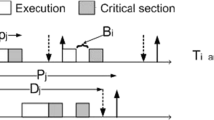Abstract
Resource partitioning is used to run several independent applications on the same hardware while avoiding error propagation. However, classical methods of validation and design are not adapted to this technique, so new methods have to be elaborated. In this paper, we define four utilization bounds, which give sufficient conditions to guarantee an execution sequence without timing faults as long as the utilization rate of the system remains under the bound. They can of course be used to validate a system with partitions, but the fact that they are based on a partial knowledge of the system allows to use them during system design. This latter point is interesting since we can thus validate a system whose parameters are not yet completely defined, which can greatly reduce the cost by avoiding many backtracks in development cycle.
Chapter PDF
Similar content being viewed by others
References
A. Bondavalli, A. Fantechi, D. Latella, and L. Simoncini. Design validation of embedded dependable systems. IEEE Micro, 21:52–62, September/October 2001.
Peter van der Stok and Paul T.A. Thijssen. Prevention of replication induced failures in the context of integrated modular avionics. In Embedded System Applications, pages 153–170. Kluwer Academic Publishers, 1997.
P. Conmy and J. McDermid. High level failure analysis for integrated modular avionics. In 6th Australian Workshop on Safety Critical Systems and Software, volume 3, 2001.
Ben L. Di Vito. A model of cooperative noninterference for integrated modular avionics. In Dependable Computing for Critical Applications (DCCA-7), 1999.
M. Nicholson, P. Conmy, I. Bate, and J. McDermid. Generating and maintaining a safety argument for integrated modular systems. In 5th Australian Workshop on Industrial Experience with Safety Critical Systems and Software, Melbourne, Australia, November 2000.
J. Rushby. Partitioning in avionics architectures: Requirements, mechanisms, and assurance. Technical report, SRI International, Menlo Park USA, March 1999.
B. L. Di Vito. A formal model of partitionning for integrated modular avionics. Technical report, NASA Langley Research Center, August 1998.
B. Andersson and J. Jonsson. Fixed-priority preemptive multiprocessor scheduling: To partition or not to partition. In Proceedings of the Int’l Conf. on Real-Time Computing and Applications, pages 337–346, Cheju Island, Korea, December 2000. IEEE Computer Society Press.
Airlines Electronic Engineering Committee. Arinc specification 653, January 1997.
B. Ford and S. Susarla. Cpu inheritance scheduling. In Usenix Association Second Symposium on Operating Systems Design and Implementation (OSDI), pages 91–105, 1996.
P. Goyal, X. Guo, and H.M. Vin. A hierarchical CPU scheduler for multimedia operating systems. In Usenix Association Second Symposium on Operating Systems Design and Implementation (OSDI), pages 107–121, 1996.
John Regehr, Jack Stankovic, and Marty Humphrey. The case for hierarchical schedulers with performance guarantees. Technical Report CS-2000-07, Department of Computer Science, University of Virginia, march 2000.
M. Nicholson and P. Hollow. Approaches to certification of reconfigurable ima systems, 2000.
M.D. Bennett and N.C. Audsley. Developing a real-time micro kernel design process. In 22nd IEEE Real-Time Systems Symposium, London, UK, December 2001. IEEE Computer Society Press.
Michael Bennett and Neil Audsley. Developing an ima kernel based on 14 for avionic systems. Technical report, Dependable Computer Systems Centre, Dept. of Computer Science, University of York, UK, 2002.
M. H. Klein, T. Ralya, B. Pollak, R. Obenza, and M. G. Harbour. A Practitioner’s Handbook for Real-Time Analysis: Guide to Rate Monotonic Analysis for Real-time Systems. Software Engineering Institute, 1999.
C.L. Liu and J. W. Layland. Scheduling algorithms for multiprogramming in hard real-time environment. Association for Computing Machinery (ACM), 20:40–61, January 1973.
J.P. Lehoczky, L. Sha, and Y. Ding. The rate monotonic scheduling algorithm: Exact characterization and average case behavior. In IEEE Real-Time Systems Symposium, pages 166–171, Los Alamitos, CA, 1989. IEEE Computer Society Press.
A.K. Mok and D. Chen. A multiframe model for real-time tasks. In 17th IEEE Real-Time Systems Symposium (RTSS’ 96), page p.22. IEEE Computer Society, December 1997.
S.K. Baruah, D. Chen, S. Gorinsky, and A. K. Mok. Generalized multiframe tasks. In Real-Time Systems, volume 17, pages 5–22, July 1999.
A.K. Mok, A.X. Feng, and D. Chen. Resource partition for real-time systems. In Seventh Real-Time Technology and Applications Symposium (RTAS’ 01), pages 75–84, Taipei, Taiwan, May–June 2001. IEEE Computer Society.
A.K. Mok and A.X. Feng. Towards compositionality in real-time resource partitioning based on regularity bounds. In 22nd IEEE Real-Time Systems Symposium (RTSS’01), page 129, London, England, December 03–06 2001. IEEE Computer Society.
A.X. Fen and A.K. Mok. A model of hierarchical real-time virtual resources. In Real Time System Symposium, pages 26–35, Austin, December 2002. IEEE Computer Society.
L. Sha, R. Rajkumar, and J.P. Lehoczky. Priority inheritance protocols: An approach to real-time synchronization. IEEE Transactions on Computers, 39:1175–1185, September 1990.
David Doose and Zoubir Mammeri. Analyse de bornes d’utilisation pour la validation de systèmes temps réel partitionnés. In RTS 2004, 2004.
T. P. Baker. A stack-based resource allocation policy for realtime. In Real-Time Systems Symposium, pages 191–200. IEEE Computer Society Press, 1990.
Author information
Authors and Affiliations
Editor information
Editors and Affiliations
Rights and permissions
Copyright information
© 2004 Springer Science + Business Media, Inc.
About this paper
Cite this paper
Doose, D., Mammeri, Z. (2004). Schedulability Analysis and Design of Real-Time Embedded Systems with Partitions. In: Kleinjohann, B., Gao, G.R., Kopetz, H., Kleinjohann, L., Rettberg, A. (eds) Design Methods and Applications for Distributed Embedded Systems. DIPES 2004. IFIP International Federation for Information Processing, vol 150. Springer, Boston, MA. https://doi.org/10.1007/1-4020-8149-9_17
Download citation
DOI: https://doi.org/10.1007/1-4020-8149-9_17
Publisher Name: Springer, Boston, MA
Print ISBN: 978-1-4020-8148-4
Online ISBN: 978-1-4020-8149-1
eBook Packages: Springer Book Archive




